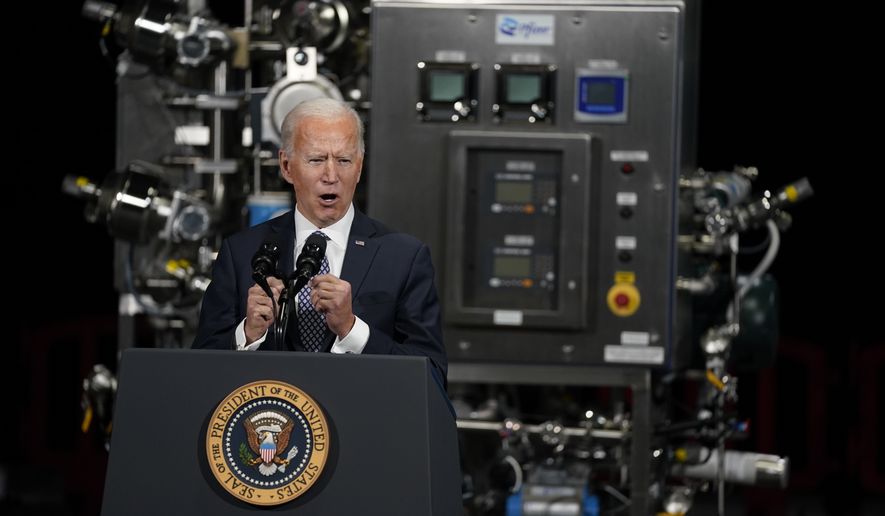President Biden said Friday that the country is on track to surpass his goal of getting 100 million coronavirus vaccines administered in his first 100 days in office.
“We’re on track to surpass my commitment,” Mr. Biden said after touring a Pfizer vaccine manufacturing facility in Kalamazoo, Michigan.
Mr. Biden reiterated his goal of having enough vaccine supply for all Americans by the end of July.
“The vaccines are safe. Please … take the vaccine when it’s your turn and available,” the president said.
Mr. Biden said the Trump administration didn’t leave him a vaccine plan, though the country was approaching one million vaccinations per day by the time Mr. Biden took office.
The president said it’s vital to increase the supply of vaccines to community health centers so that the Black and Latino populations can get access.
“This is important — to ensure everyone is treated equally and those hardest-hit get the care they deserve,” he said.
Speaking before Mr. Biden, Pfizer CEO Albert Bourla said the company soon plans to more than double the current level of 5 million dose shipments per week for the U.S.
He said they’re on track to provide the federal government 120 million doses by the end of March and release 200 million doses by the end of May - two months earlier than their original time frame.
Mr. Bourla said the company has found a “great ally” in the Biden administration, saying Mr. Biden’s team has “significantly aided” their efforts in vaccine manufacturing and distribution.
Mr. Biden toured a Pfizer manufacturing site in Kalamazoo, Michigan that employs 2,240 people full-time and employs 540 contractors.
The tour included a look at a “freezer farm” of 350 freezers that each can store 360,000 doses of the vaccines.
Pfizer’s vaccines must be stored at minus-70 degrees Celsius, posing a logistical hurdle, though states have found ways to handle them and get them into arms. Plus, the shots can be stored in a normal refrigerator for up to five days.
The company announced earlier Friday that their vaccine proved stable when stored at about minus-20 degrees Celsius, along the lines of temperatures of pharmaceutical refrigerators and freezers.
The company provided the U.S. Food and Drug Administration new data to secure an update to its emergency use authorization so vials can be stored at the higher temperatures for two weeks.
“If approved, this new storage option would offer pharmacies and vaccination centers greater flexibility in how they manage their vaccine supply,” Mr. Bourla said.
The company has also devised proprietary “thermal shippers” that store the vaccines in dry ice instead of relying on federal distributors.
Pfizer, a leading drugmaker based in New York City, developed the vaccine with German company BioNTech, a pioneer in messenger-RNA therapies.
The two-dose vaccine proved about 95% effective in staving off disease, validating the mRNA platform and paving the way for emergency approval of the vaccine on Dec. 11.
The Lancet, a medical journal, published new research this week that found the first shot of Pfizer’s two-dose regiment was about 85% effective in cutting symptomatic disease 15-28 days after the first dose.
The study included about 9,000 people in Israel.
The single dose was about 52% effective in preventing infections in Pfizer’s clinical trials.
A similar vaccine, from Moderna, was also approved.
The pair of vaccines remain the only ones approved for use in the U.S., though Johnson & Johnson could earn approval of its adenovirus vaccine by early March.
Pfizer’s version was the first COVID-19 vaccine approved in the West. The U.K. started using it in early December, beating the U.S. by several days.
Unlike other companies, Pfizer did not accept federal assistance from the Trump administration under “Operation Warp Speed,” though it did enter a purchasing agreement last summer to supply the U.S. government with doses.
The Biden administration recently used the Defense Production Act to make sure Pfizer gets certain pieces of equipment ahead of other companies, as it churns out vaccines.
• Tom Howell Jr. can be reached at thowell@washingtontimes.com.
• David Sherfinski can be reached at dsherfinski@washingtontimes.com.




Please read our comment policy before commenting.